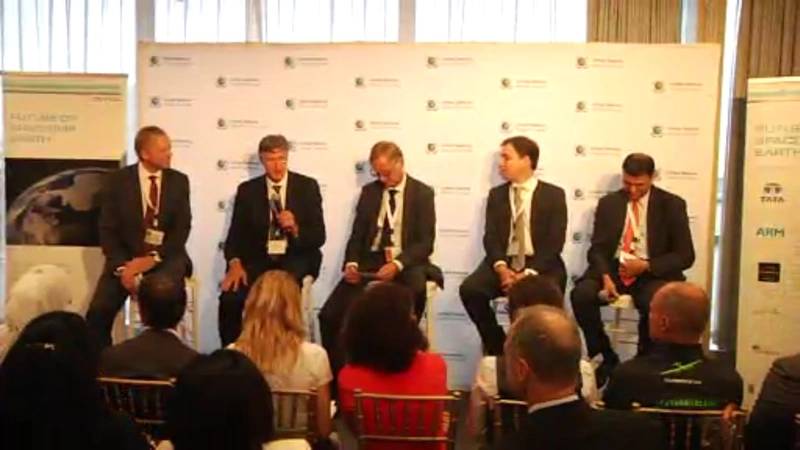At a presentation this morning at the United Nations in New York, Remi Eriksen, CEO, DNV GL led a presentation on “The Future of Spaceship Earth,” a global forecast on the outlook for the world to 2050. The skinny: The world needs to move further, faster on multiple fronts to ensure the sustainable future of the planet.
Calling for “extraordinary action” to achieve the 17 Sustainable Development Goals (SDG’s) as presented in 2015, Remi Eriksen, CEO, DNV GL introduced “The Future of Spaceship Earth,” a global forecast on the outlook for the world to 2050, at the UN in New York this morning.
“I kind of feel like Ed Harris in ‘Apollo 13’” Eriksen said before cutting to a video clip on the new study. "Failure is not an option. We need new trailblazers ... companies that can innovate around these new goals."
The two critical questions that the report set out to answer were:
Will the world achieve the United Nations’ 17 Sustainable Development Goals (SDGs) by 2030?
What can business do to lead the charge?
The report concludes that, while many of the goals will make good progress across several world regions, action will not be fast enough or fair enough and will come at an unacceptable environmental cost. However, there is still time to reset the course of our ‘Spaceship Earth’: the report showcases 17 global companies driving extraordinary progress on each of the global goals.
One year after the SDGs’ launch, businesses, governments, organizations and individuals everywhere have started to work towards the global goals. However, the Future of Spaceship Earth forecast shows that none of the goals will be met in all regions of the world. Likewise, no single region will achieve the necessary progress towards all the goals. The scale of the challenge is such that urgent, extraordinary action is now needed.
Business is uniquely positioned to drive this magnitude of action. The report highlights 17 global companies at the frontier of progress on the SDGs; Tata, Danone, HiTechnologies, ARM, Symantec, Grundfos, SolarWorld, NYK, Hydro, Safaricom, Siemens, Marks & Spencer, Iberdrola, Cermaq, APP, Calvert Investments and Unilever. These pioneers are driving sustainable change through innovations, partnerships and adjustment of business models. The Sustainable Development Goals have become a blueprint for companies to reshape and future-fit their business.
All the companies featured in the report are signatories to the UN Global Compact, an initiative to encourage businesses worldwide to adopt sustainable and socially responsible policies and thus contribute to a sustainable future.
Key findings from the ‘Future of Spaceship Earth’ report:
None of the global goals will be met in all regions of the world
Moreover, not even half of the goals will be met in any of the regions
Good health and well-being (3), Quality Education (4), Clean Water and Sanitation (6), Affordable and Clean Energy (7) and Industry, Innovation and Infrastructure (9) have the most positive outlooks
We are also moving in the right direction on several other goals, particularly for human development such as Poverty (1), Hunger (2) and Gender Equality (5)
Within countries, the inequality gap will continue to widen – and between counties, developing nations will continue to lag behind
The replacement of fossil fuels with renewable energy sources is underway
On the current trajectory, we will exceed the carbon budget by the year 2037, entering increasingly dangerous climate change territory
From 2030 onwards, the growth in energy demand will level off, due to the fact that improvements in energy efficiency will outpace the energy demands created by growth in population and productivity
17 UN Global Compact signatories are contributing with their insight:
Sustainable Development Goals (SDGs) Company Head quarter
1. No poverty Tata India
2. Zero hunger Danone France
3. Good health and well-being HiTechnologies Brazil
4. Quality education ARM UK
5. Gender equality Symantec US
6. Clean water and sanitation Grundfos Denmark
7. Affordable and clean energy SolarWorld Germany
8. Decent work and economic growth NYK Japan
9. Industry, innovation and infrastructure Hydro Norway
10. Reduced inequalities Safaricom Kenya
11. Sustainable cities and communities Siemens UK & Germany
12. Responsible consumption and production Marks & Spencer UK
13. Climate action Iberdrola Spain
14. Life below water Cermaq Norway
15. Life on land APP Indonesia
16. Peace and justice Calvert Investments US
17. Partnerships for the goals Unilever UK & the Netherlands





















